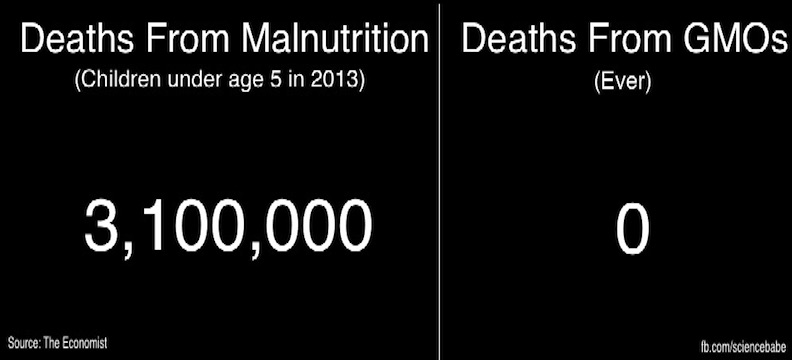I spend a good deal of time making a point like this, somewhat more subtly of course, than the SciBabe. The title of her article is priceless, and spot on.
Lost in the hot rhetoric she uses is certainly the idea that “natural” is not to be conflated with “good.” This is obvious for things like arsenic. Arsenic occurs naturally. It is not a GMO. Now, it is not organic, but that is because it is not an organic substance. It is widespread. We are not running out of it. And it is toxic to us even in small doses. But the word “natural” has such emotional appeal that it has come to be synonymous with good.
I have a student from Dubai who tells me that it can get to 120 degrees in the summer where she lives. She told me that she would “die without air conditioning.” That air conditioning is unnatural, and of course being powered by coal is “unnaturally” making the planet dirtier and hotter. More generally, it is always worth reminding people that for millions of years man has fought her natural environment in a horrible struggle for survival. Nature was something to be feared not enjoyed.
I have one nit to pick with the SciBabe … we should stop calling GMOs GMOs. There are all kinds of ways that agricultural products can be manipulated – gene mutation, transgenic methods, etc. so the blanket term GMO is misleading. Second, there are obviously all kinds of “natural” GMO processes which happen without our distinct interventions yet those don’t seem to get a rise out of anyone. The sweet potato we know and love, via early selection, is the product of a gene from a bacteria inserting itself into the sweet potato genome. It’s exactly the same thing scientists now do in a lab.
I’ll send a craft beer from Wintercow Brewing Company to someone who can send me a picture from their store touting “non-GMO” Sweet Potatoes.

Let’s put aside what “GMO” really means, and take it to mean whatever mainstream science and anti-GMOers want it to mean…someone sent me this: http://www.ncbi.nlm.nih.gov/pmc/articles/PMC2875113/#R1
It says 19 deaths from glyphosate, a common ingredient in GMOs (also many non-GMOs), which a quick skim around the internet reveals is probably not good for you (whether it’s as toxic as arsenic or not).
Thoughts?
OMG, I can’t believe the paper you linked to! It is a paper talking about people who INTENTIONALLY POISONED themselves with humongous doses of glyphosate, and still the death rate was in the 3% range.
A review of what is known about glyphosate is that it is EXTREMELY NON-toxic, which is one reason why it has become so popular. Furthermore, at the doses you would ever be exposed to it is not going to cause problems, even for folks who work in the field all day. It is really cheap considering what it does, and most important, glyphosate is OFF-patent at the moment, so anyone can make it. In other words, for those on the interweb wanting to demonize it because some corporation is trying to get you to use it, that is perhaps 180-degrees from what corporations want right now. Companies want you to use something NEW and more expensive.
Finally, our modern detection methods are much better than in the past, so detection at extraordinarily low levels is common.
Finally, glyphosate is most certainly NOT an INGREDIENT in GMOs. This kind of misinformation has got to stop. Crops have been modified so that they would be RESISTANT to glyphosate, not so that glyphosate is in them. Making crops resistant to the stuff enables farmers to use the herbicide to control weeds without harming the crop. Doing this has allowed farmers to control weeds much more easily than in the past, has enabled the introduction of sustainable “no till” farming techniques and of course has lowered food costs.
When they said intentional I kept thinking “no way”. I thought maybe they intentionally ingested food knowing it had glyphosate on it.
Thanks for the other info. Can you point me to that review? It’s hard to find anything saying it’s non toxic, esp. Anything discussing doses